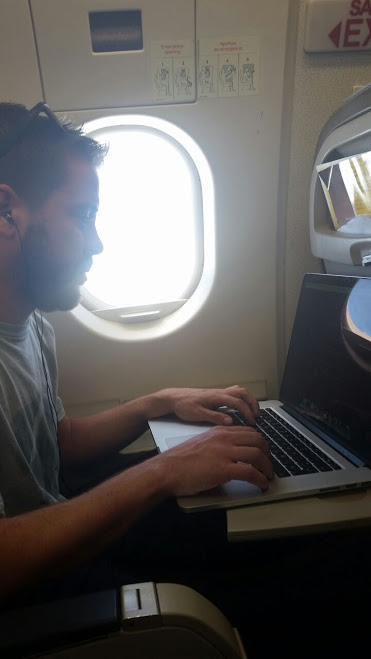Our six tips for working remotely
Captain's log, stardate d256.y36/AB

At MarsBased, we have a strongly defined company culture. We believe that in order to compete with bigger companies, smaller ventures have to define a strong company culture that attracts like-minded people.
One of our core principles is being able to work remotely. As an officeless company, we want to be able to work from wherever we are, regardless of our location or time-zone. As long as the work gets done, who cares where did you write your code from?
While you wait for the second part of our blogging guide (read the first part here), you can read our team's advice for working remotely.
Companies that are 100% digital and do not require a big physical infrastructure such as storage, a lab, servers, or other machinery, can perfectly exist without having an office.
An office requires maintenance, paying more bills, hiring basic services (phone, internet, water, A/C, etc.) and generally increases the number of chores that most small companies cannot afford to spend nor their money neither their time in.
While some companies have adopted this lifestyle and work from home, some others have become digital nomads, such as 8fit, that travel together around the world, building their product from awesome places such as Bali, Berlin or the Canary Islands.

We, for one, like to work from home and take advantage of this flexibility by moving around. For instance, it's cheaper to travel during the week, so we might fly for a weekend off to Italy on Wednesday, and work from there during Thursday and Friday, and then spend the whole weekend enjoying the vacation, instead of packing up last minute and waiting for delayed or overbooked flights.
Having no office has some downsides, but also many advantages. We will cover this in future blog posts.
Some companies might prefer it the other way, but we were adamant that our company would be 100% remote from the very beginning.
As a service provider, working mostly with SaaS and cloud-based solutions, we do not require anything more than a laptop and an Internet connection (all of which we can have at home). Moreover, we like traveling, so coding from San Francisco, Barcelona or Germany makes no difference at all.
For instance, last week we launched Eureka Startups Experts from Berlin. Javi and I were in the capital of Germany for 10 days of remote working.
We were actually the only two people directly involved in the project. So working together remotely brought a different kind of focus that isolated us from other distractions. We could round off a very safe launch for this complex project and not being in Barcelona didn't make any difference whatsoever.
After over a year of working remotely from awesome places like Munich or Berlin (Germany), the island of Hvar (Croatia) or San Francisco (USA), our team wants to share some of their tips with all of you.
 Jordi Vendrell Founder & COO
Jordi Vendrell Founder & COOBeing very strict with my working hours is really important to me. I have set a fixed schedule that I try to respect every day.
Unlike in traditional workplaces, here I can start working earlier than most people if I predict interruptions throughout the afternoon. It's very usual for me to start working at 6:30 or 7:00 am if I know I'll have to take care of urgent matters after lunch.
Also, I believe it's equally important to go out for a while after work. Exercising or going for a walk can do wonders.
 Xavier Simo Backend developer
Xavier Simo Backend developerBy working remotely, you spend way too much time indoors. I try to go for a walk twice a day: once during the lunch break and the second right after work, to wind down.
Besides that, I also try to identify all possible distractions that might interrupt me before focusing on big tasks ahead. This way, I can prevent them, put them off or even deal with them before their time, so that nothing breaks my concentration.
 Xavier Redó Founder & CTO
Xavier Redó Founder & CTOI also find it essential to wind down by going for a walk. In my case, I prefer to do it early in the morning, before kicking off the day, to go out for bread or coffee, or simply to breath some fresh air. Just go out.
It's also important to get your daily dose of daylight. People benefit from daylight as it has a direct effect on your mood. I highly recommend working by daylight.
Last, but not least, it's important to think outside of the box. Dare to be different: most people carry their habits from their previous corporate job into their new setup.
Breaking these mental barriers makes you enjoy your job much more. For instance, you can program while drinking a cold beer, blasting loud music, planning your next week sitting in the balcony, or even reordering your day and going out for groceries at noon, in order to be more productive later in the day. All that matters is that these little things make you more productive.
 David Gómez Full-stack Engineer
David Gómez Full-stack EngineerOne thing that works well for me is splitting my day in two with a pause to practice sport. I try to work out using my stationary bicycle or going to the gym in the middle of the day.
I too find it very important to dress accordingly when working, avoiding pyjamas and slippers. This is one of the main things I learnt from Remote: No Office Required and have strictly incorporated this in my daily routine.
 Javier Pérez Developer
Javier Pérez DeveloperWhen choosing my workplace, I need to make sure there's direct sunlight and street view. Both things make it a more pleasant environment for me, and they make me feel more energized.
Actually, being able to see what's happening in the street allows me to change focus and stop staring at the screen for a while. As a developer, I get a high amount of screen-time, so I need to rest my eyes every now and then.
My ideal workplace does definitely not look like an office. The farther from an office it looks, the more I like it, so coffee shops and libraries are where you will find me.
 Àlex Rodríguez Bacardit Founder & CEO
Àlex Rodríguez Bacardit Founder & CEOI'm working on the sales area, so I get lots of interruptions from outside the company (phone calls, unsolicited emails, events, etc.). Most of them require immediate or short-term attention, so rarely ever I work on tasks that need more than one hour of focus and break down everything to work on short but intense sprints. I leave long tasks for night-time, when no one's around.
I also find it very challenging to go out and explore a new place to work from every week. That helps me break the routine and discover really cool places.
Moreover, I spend most of the day meeting clients or going to events, so sometimes I can't go back home between meetings. I always browse Foursquare to find good working places nearby.

Working in all-remote environments means having to bond with your teammates also remotely. Here's one of the many things we do to create a better working environment at MarsBased: we host a musical contest every week
Read full article
Maintaining a strong company culture can be tricky, but it's trickier in distributed teams and all-remote companies. In this post, we discuss how we do it in our officeless development consultancy.
Read full article
We have been working remotely since we created the company, in 2014. We want to share a few personal tips that will make remote working a better experience and sustainable over time.
Read full article